Liquefactive - Study guides, Class notes & Summaries
Looking for the best study guides, study notes and summaries about Liquefactive? On this page you'll find 752 study documents about Liquefactive.
Page 3 out of 752 results
Sort by
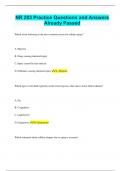
-
NR 283 Practice Questions and Answers Already Passed
- Exam (elaborations) • 29 pages • 2024
-
Available in package deal
-
- $9.99
- + learn more
NR 283 Practice Questions and Answers Already Passed Which of the following is the most common reason for cellular injury? A. Hypoxia B. Drugs causing chemical injury C. Injury caused by free radicals D. Pollutants causing chemical injury A. Hypoxia Which type of cell death typically results from hypoxia, often due to lower limb ischemia? A. Fat B. Coagulative C. Liquefactive D. Gangrenous D. Gangrenous Which statement about cellular changes due to aging is accurate? A. These change...
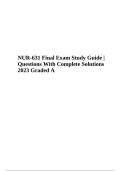
-
NUR-631 Final Exam Study Guide 2023 (Questions With Complete Solutions Graded A+)
- Exam (elaborations) • 24 pages • 2023
-
- $24.49
- 1x sold
- + learn more
NUR-631 Final Exam Study Guide 2023 (Questions With Complete Solutions Graded A+) fibers arise from nasal olfactory epithelium and form synapses with olfactory bulbs that transmit impulses to temporal lobe Hypoglossal nerve - ANSWER *XII* -stick out tongue -motor fibers to muscles of tongue and sensory impulse from tongue to brain -fibers arise from medulla and exit from skull and extend to tongue trigeminal nerve - ANSWER *V* -sensations of pain, touch, temperature, corneal reflex, clenc...

-
Gould’s Pathophysiology for the Health Professions 5th Edition VanMeter Hubert Test Bank
- Exam (elaborations) • 422 pages • 2023
-
Available in package deal
-
- $17.99
- 1x sold
- + learn more
Gould’s Pathophysiology for the Health Professions 5th Edition VanMeter Hubert Test Bank Gould’s Pathophysiology for the Health Professions 5th Edition VanMeter Hubert Test Bank 01: Introduction to Pathophysiology Chapter 01: Introduction to Pathophysiology Test Bank MULTIPLE CHOICE 1. Which of the following would be the most likely cause of an iatrogenic disease? a. An inherited disorder b. A combination of specific etiological factors c. An unwanted effect of a prescribed drug ...
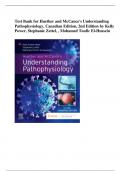
-
Test Bank for Huether and McCance's Understanding Pathophysiology, Canadian Edition, 2nd Edition by Kelly Power, Stephanie Zettel, , Mohamed Toufic El-H
- Exam (elaborations) • 370 pages • 2024
-
- $19.89
- 1x sold
- + learn more
Test Bank for Huether and McCance's Understanding Pathophysiology, Canadian Edition, 2nd Edition by Kelly Power, Stephanie Zettel, , Mohamed Toufic El-Hussein Table of Contents PART ONE: BASIC CONCEPTS OF PATHOPHYSIOLOGY Unit 1: The Cell 1. Cellular Biology 2. Genes and Genetic Diseases 3. Epigenetics and Disease 4. Altered Cellular and Tissue Biology 5. Fluids and Electrolytes, Acids and Bases Unit 2: Mechanisms of Self-Defense 6. Innate Immunity: Inflammation and Wound Healing ...
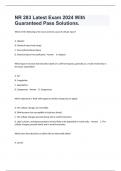
-
NR 283 Latest Exam 2024 With Guaranteed Pass Solutions.
- Exam (elaborations) • 18 pages • 2024
-
Available in package deal
-
- $9.99
- + learn more
Which of the following is the most common cause of cellular injury? A. Hypoxia B. Chemical injury from drugs C. Free radical-induced injury D. Chemical injury from pollutants - Answer A. Hypoxia Which type of necrosis best describes death of a cell from hypoxia, generally as a result of ischemia in the lower extremities? A. Fat B. Coagulative C. Liquefactive D. Gangrenous - Answer D. Gangrenous Which statement is TRUE with regard to cellular change due to aging? A. The...

-
NR 283 Practice Exam Questions and answers
- Exam (elaborations) • 18 pages • 2024
-
- $11.49
- + learn more
NR 283 Practice Exam Questions Which of the following is the most common cause of cellular injury? A. Hypoxia B. Chemical injury from drugs C. Free radical-induced injury D. Chemical injury from pollutants - A. Hypoxia Which type of necrosis best describes death of a cell from hypoxia, generally as a result of ischemia in the lower extremities? A. Fat B. Coagulative C. Liquefactive D. Gangrenous - D. Gangrenous Which statement is TRUE with regard to cellular change due to aging? A. ...
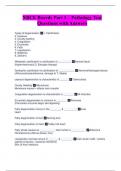
-
NBCE Boards Part 1 – Pathology Test Questions with Answers
- Exam (elaborations) • 29 pages • 2024
-
Available in package deal
-
- $14.99
- + learn more
Types of Degeneration 1. Calcification 2. Caseous 3. Cloudy swelling 4. Coagulation 5. Enzymatic 6. Fatty 7. Liquefaction 8. Wallerian 9. Zenker's Metastatic calcification is calcification of _________. Normal tissue (Hypervitaminosis D, Estrogen therapy) Dystrophic calcification is calcification of ___________. Abnormal/damaged tissues (Atherosclerosis/atheroma, damage to T. Media) caseous degeneration is characteristic of ______. Tuberculosis Cloudy Swelling Albuminous ...
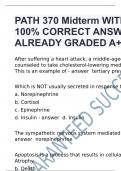
-
PATH 370 Midterm WITH 100% CORRECT ANSWERS ALREADY GRADED A+.
- Exam (elaborations) • 24 pages • 2024
- Available in package deal
-
- $12.49
- + learn more
Latent period Time between exposure of tissue to injurious agent and first appearance of signs and/or symptoms Latent period also refers to a period during an illness when signs/symptoms temporarily become mild or silent or disappear Remission decrease in severity, signs, or symptoms; may indicate disease is cured Prodromal period time during which first signs and/or symptoms appear indicating onset of disease Subclinical stage patient functions normally; diseas...
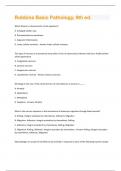
-
Robbins Basic Pathology, 9th ed. Exam Questions And Answers Already Graded A+
- Exam (elaborations) • 17 pages • 2023
- Available in package deal
-
- $8.49
- + learn more
Which feature is characteristic of cell apoptosis? A. Enlarged swollen size B. Disrupted plasma membrane C. Adjacent inflammation D. Intact cellular contents - Answer Intact cellular contents This type of necrosis is encountered most often in foci of tuberculosis infection and has a friable yellowwhite appearance. A. Coagulative necrosis B. Caseous necrosis C. Gangrenous necrosis D. Liquefactive necrosis - Answer Caseous necrosis Shrinkage in the size of the cell by the loss of cell su...
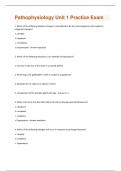
-
Pathophysiology Unit 1 Practice Exam 2024 questions and answers all are graded A+
- Exam (elaborations) • 13 pages • 2024
- Available in package deal
-
- $7.99
- + learn more
1. Which of the following adaptive changes is considered to be the most dangerous with regard to malignant changes? a. atrophy b. dysplasia c. metaplasia d. hypertrophy - Answer-dysplasia 2. Which of the following situations is an example of hyperplasia? 1. increase in the size of the heart in a trained athlete 2. thickening o the gallbladder's walls in response to gallstones 3. development of callus on a laborer's hands 4. enlargement of the prostate gland with age - Answer-3, 4 3....

How much did you already spend on Stuvia? Imagine there are plenty more of you out there paying for study notes, but this time YOU are the seller. Ka-ching! Discover all about earning on Stuvia


